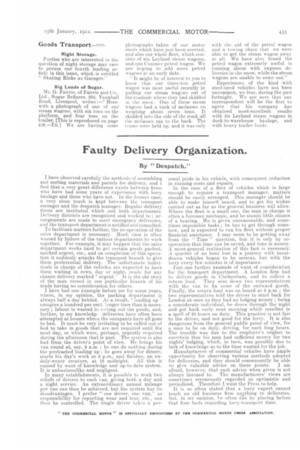Faulty Delivery Organization.
Page 13

If you've noticed an error in this article please click here to report it so we can fix it.
By "Despatch."
I have observed carefully the methods of assembling and sorting materials and parcels for delivery, and I find that a. very great difference exists between firms who have had some years of experience with lorry haulage and those who have not. In the former ease, a very close touch is kept between the transport manager and the despatch manager. Regular delivery times are .instituted which suit both departments. Delivery -districts are recognized and worked to ; arrangements are made to meet emergency deliveries, and the transport department is notified and consulted. To facilitate matters further, the co-operation of the sales department is necessary. Much time is often wasted by failure of the various departments to work together. For example, it may happen that the sales department works hard to get certain goods packed, marked urgent, etc., and on completion of this operation it suddenly attacks the transport. branch to give them preferential delivery. The unfortunate individuals in charge of the vehicles are expected to have them waiting in rows, day or night, ready for any chance delivery marked "urgent." It is the old story of the man versed in one particular branch of his trade having no consideration for others.
I have had one example before me for some years, where, in my opinion, the packing department is always half a day behind. As a result, "loading up" eccupies a hundred per cent. longer time than is necessary; labour is wasted hi sorting out the goods, and, further, to my knowledge deliveries have often been attempted at houses where the occupants have all gone to bed. It must be very irritating to be called out of bed to take in goods that are not required until the next day, or which were, perhaps, urgently required during the afternoon that is past.. The system is also bad from the driver's point of view. He brings his van round at, say, 9 a.m. ; he can do nothing during the protracted loading up ; he goes away for dinner, starts his day's work at 2 p.m., and finishes, an un duly-weary creature, at 12 midnight. All this is caused by want of knowledge and up-to-date system. It is uiabusinesslike and negligent.
In many establishments, it is possible to work two reliefs of drivers to each van, giving both a day and a night service. An extraordinary annual mileage per van can thus he achieved, but the system has its disadvantages. I prefer " one driver, one van," as responsibility for reporting wear and tear, etc., can then be controlled. The single driver takes a per
sonal pride in his vehicle, with consequent reduction in running costs and repairs_
In the ease of a fleet of vehicles which is large enough to require a transport manager, matters should be easily arranged. This manager should be able to make himself heard, and to get his wishes carried out as far as the general business will allow. Where the fleet is a, small one, the man in charge is often a foreman mechanic, and he stands little chance of a hearing. He is given unreasonable, and sometimes impossible tasks; he has to get through somehow, and is expected to run his fleet without proper. financial assistance. I may seem to be getting away from the " Time " question, but it is only by cooperation that time can be saved, and time is money. A more-general realization of this fact is necessary. A quarter of an hour lost in a journey with horsedrawn vehicles began to be serious, but with the lorry every few minutes is of importance. Just one further example of want of consideration for the transport department. A London firm had to deliver goods in Cheltenham, and to collect a return load. They sent down two representatives with the van to fix some of the outward goods. Finally, the return load was on board at 6 p.m. ; the two representatives told the driver to start back for London at once as they had no lodging money ; being a considerate individual, he drove through the night and got back early next morning which resulted in a spell of 28 hours on duty. This praetice is not fair to the driver, and not good for the lorry. It is also dangerous from the general public point of view, for a man to be on duty, driving, for such long hours. The trouble was due to the employer's neglect to ascertain that his men had sufficient money for two nights' lodging, which, in turn, was possibly due to lack of knowledge as to the time wanted for the job.
Manufacturers of commercial vehicles have ample opportunity for observing various methods adopted for deliveries, and they should consequently be able
to give valuable advice on these points. I am afraid, however, that such advice when given is not always listened to. The manufacturers' views are sometimes erroneously regarded as optimistic and prejudiced. Therefore I want the Press to help. It is so often stated that a lorry expert cannot teach an old business firm authing re deliveries, but, in my opinion, 1:e often -can by placing before that firm facts regarding lorry-transport time..






















